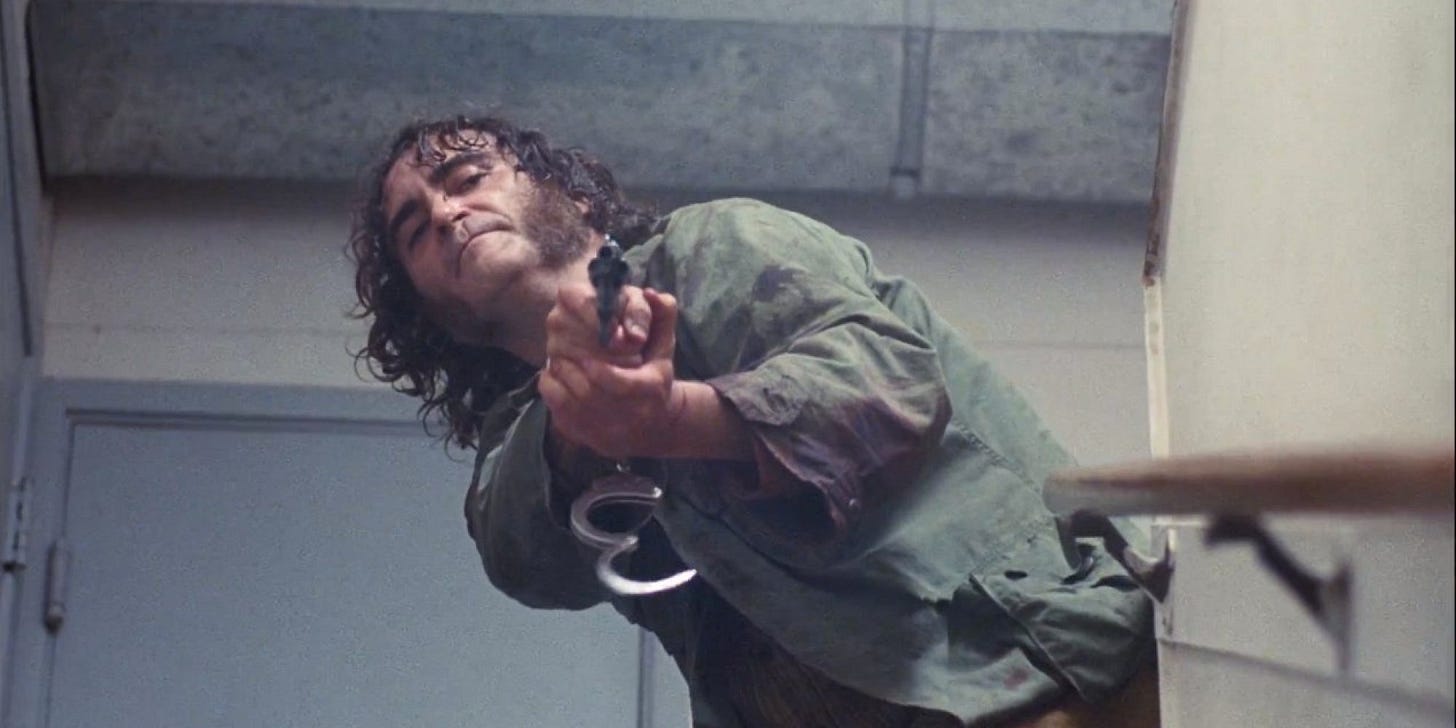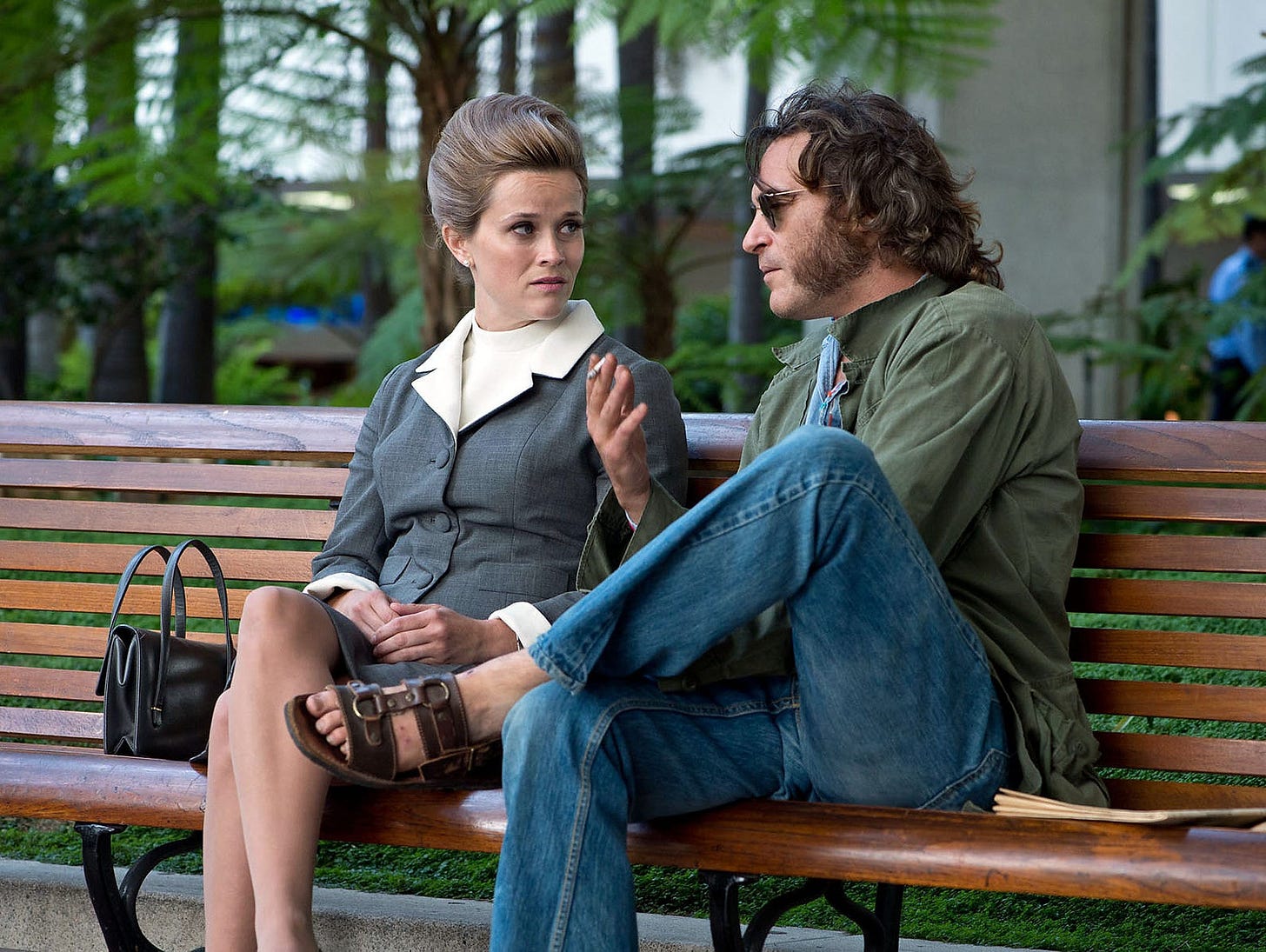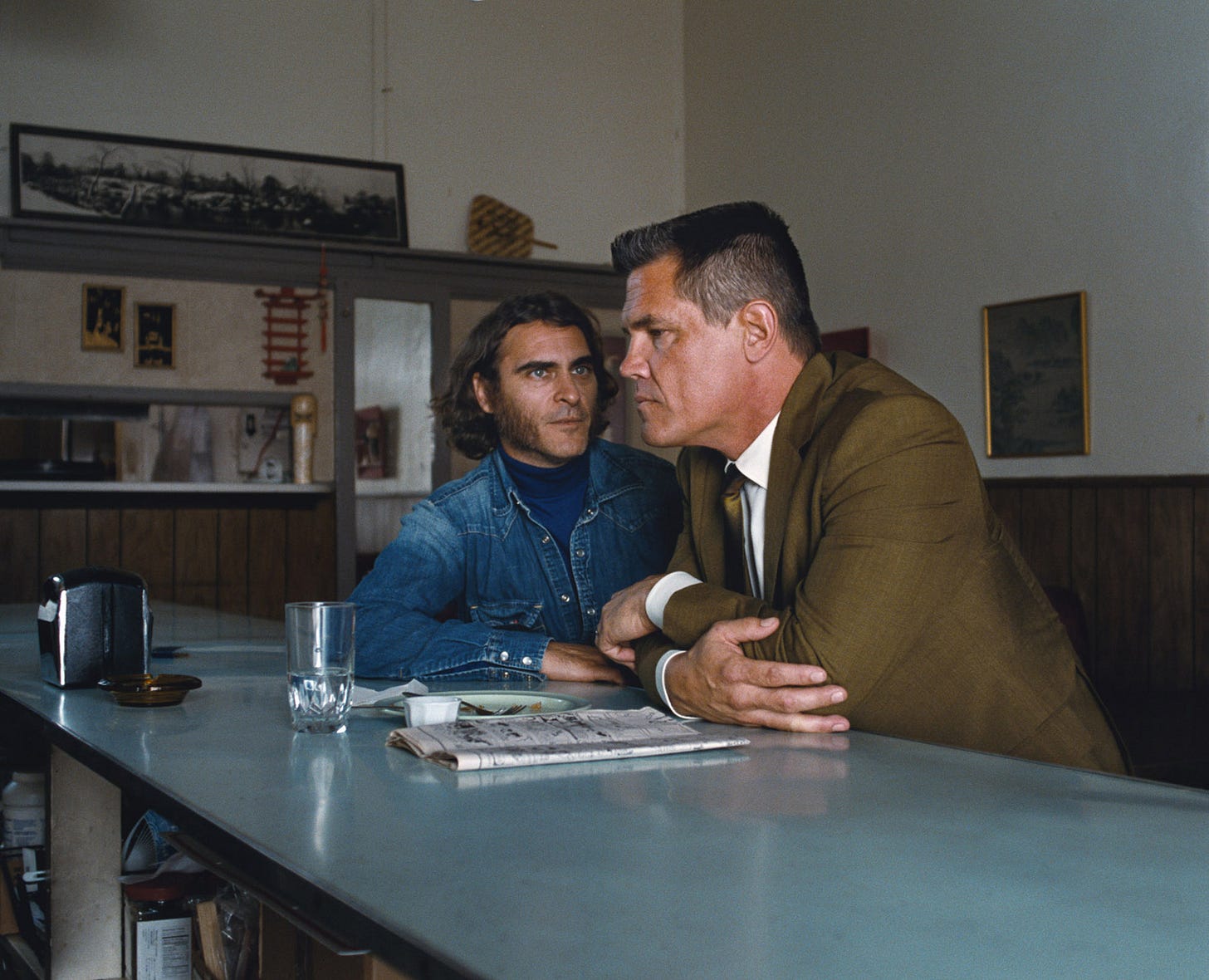Before I went to prison, I had read many books in my youth. But in my twenties, it’s safe to say that slowed down considerably, and I did not have nearly as much experience consuming actual literature as I should. When my friend sent a copy of “Inherent Vice” to me while I was in holding, I realized it would end up being my first taste of the work of Thomas Pynchon. It was also a glimpse into what to expect from the filmic adaptation which was in theaters at that point. I didn’t want to be a “scout” per se, but there were a number of books I consumed while I was down in anticipation of their adaptation. There were also books I read without realizing they would be adapted into movies or shows. As much as I read these books as books, I couldn’t help but often imagine them cinematically.
This task proved even easier knowing that Paul Thomas Anderson was behind this. I don’t want to make it seem like I’m a blind devotee of Anderson’s moves, when really they just kind of wash over me and envelope me. Each one excites in a different way – they are massive but tactile, epic yet intimate. “Boogie Nights” might be considered explicit in the eyes of a more conservative viewer (boo, by the way), but I think it’s one of a handful of perfect movies, funny and touching and frightening and upsetting and in the end triumphant. My last P.T. Anderson movie before I went down was “The Master”, and though I saw it in 2012, it echoed in my head for the following two years, a decades-spanning tale of a broken man and the wealthy manipulator who turns him into his dog.
It’s interesting to adapt “Inherent Vice”, a book written in a dreamy psychedelic haze, into something as concrete as a movie with a beginning, middle and end. Maybe there’s a version of this that’s appropriately nonsensical, one big semicolon followed by a question mark. I’d like that version. But I love this one. Anderson doesn’t receive credit for being a brilliant comic mind. So much in “Boogie Nights” is hilarious. The manner in which Daniel Plainview berates would-be threats in “There Will Be Blood”, Tom Cruise’s Frank T.J. Mackey in “Magnolia”, the whole of “Punch Drunk Love” – Anderson is a funny guy. He married Maya Rudolph, he’s clearly got an upper tier appreciation of funny stuff.
“Inherent Vice” will crack you up on the page. But the movie is mostly about staying true to the source while still providing enough laughs regarding the premise’s contradiction: Doc Sportello (Joaquin Phoenix) is a P.I. trying to crack a case despite swimming through a fog of smoke, barefoot and smashed. This is a maximalist version of the chief appeal of the P.I. narrative, the idea that not anyone can be a cop, but just about any idiot with the right connections could work as a private investigator. As Sportello, Phoenix is big and bumbly and completely absent from this world. Like the dumbest hobbit from the Shire, hairy, barefoot, and determined to bathe himself after this one thing, and maybe that second thing, and eventually maybe, oh, what time is it?
It’s the 1970’s, and Sportello is haunted by the disappearance of his ex-girlfriend Shasta (Katherine Waterson). Much of what we see of them, maybe flashback, maybe hallucination, suggests their dalliance was borne out of shared addictions, but perhaps those recollections are tinted by Sportello’s own consumptive activities. He’s asking around to see if anyone knows of the whereabouts of her and her wealthy lover (Eric Roberts), and instead, he’s getting wrapped up in several other cases, involving a glamour-seeking cop (Josh Brolin), his wildly-imaginative conspiracy theorist lawyer (an as-always-underused Benicio Del Toro) and an ex-fling turned assistant D.A. (Reese Witherspoon).
Sportello is largely passing through, wrapped up in a saga involving whatever the Golden Fang is supposed to be, taken along for the ride by people like Dr. Blatnoyd, an overmedicated dentist who may have cult ties and who definitely does not know the time of day. Blatnoyd is played by Martin Short – in my head canon, this is who the lead character in Short’s “Clifford” grows up to be. He’s one of so many wonderful faces in this movie – as a specter haunting the proceedings, Owen Wilson is yet another missing man, and the wonderfully versatile Hong Chau (three years before her breakout in “Downsizing”) pops up as an oversexed massage parlor employee.
This is an intensely sexy movie, in ways I did not foresee and maybe can’t articulate. Even the disgusting Phoenix, earthy and giving off an odor that the audience can practically smell, comes across as alluring as the 80’s illustrations of Wolverine in Marvel comics, when the diminutive Canadian mutant was depicted as feral and unclean and very much not-Hugh Jackman. There’s something sexy in the platonic relationship between Phoenix and the enchanting musician Joanna Newsom, who looks over him the way you’d expect a real-life faerie like Newsom would. There’s also a scene with Michelle Sinclair, the former Belladonna, where she holds her own with Phoenix even if it’s uncertain if the moment is meant to be metatextual or not.
Of course, that sexuality is barbed, removed from a real time context. This is the type of sexuality where repulsive men in power thrived, and beautiful women understood the endless allowances they had to make as young, supple sources of mens’ pleasure. It’s sick, in other words, it’s culturally diseased. But it is about distorted power dynamics, which gives the film’s sexuality a transgressive thrill. I’m curious as to how this aspect was received a decade ago, given the film seems to have a peculiar reputation (one that will be re-evaluated, perhaps, upon the release of Anderson’s next Pychon adaptation, “One Battle After Another”).
I am thankful for sites like the Marshall Project to help get the word out about incarceration, particularly in how they prompt me to address certain issues. I just wish the Marshall Project didn’t have much to write about. This is a particularly crucial article reporting what people on the outside assume is a dichotomy between inmates and prison officials. Indeed, there’s a third party present, and it’s often the medical staff. They are meant to do the dirty work when prisoners are injured by staff – by assisting the injured, and/or trying to cover up the violence and cruelty. Because it’s not just an invention of fiction that c.o.’s wish to exert their will and procure a pound of flesh from those underneath them. I never saw the worst of it, but what I saw – inmates in headlocks, pulled out of bed by their legs, thrown to the floor – was more than enough. It never occurred to me how the medical department would treat this – maybe by reporting a “bad fall”, or by some sort of accident, but certainly not the truth about an overzealous officer, one who could find that doctor or dentist and retaliate.
I remember when I checked into the health department with a broken jaw. Instead of providing immediate care, they turned me away, forcing me to the lieutenant’s office. I was ordered to report my injuries as the result of a fight. When I was there, I told them that I had endured an accident on the basketball court, an elbow to the face that broke my jaw in two places. The medical officials simply nodded and shrugged, accepting that I was telling a silly story because there was no upside to snitching on my attackers. One officer approached me, knowing my story was nonsense, and he demanded to know the truth. To him, I said that, in fact, I was attacked by an officer who was raiding my room. He smirked at this, but he certainly stopped asking questions. Particularly when I described the officer as having his physical attributes.
In another instance, I knew of a rule change that was being proposed by the warden. Some of the other inmates with longer sentences openly discussed how they’d respond to the news with a series of indiscriminate stabbings. I sought out the assistant warden (who openly lied to me about being the associate warden, as if we didn’t all know) and told him that there would be severe negative repercussions if the changes were brought forth. Naturally, he focused on me, and asked if I felt like I was in danger, and by whom. I told him I had no such concerns for myself, and that even if I did, I wasn’t going to rat someone out to him. He proceeded to suggest I give him a list of names, write it on a piece of paper, and hand it to him the next day during lunch. In the cafeteria. In front of hundreds of inmates. I politely told him off for suggesting something so obnoxious, but he knew what he was doing. Later, I spoke of this interaction with a prison therapist, and all he could do was shake his head. Why jeopardize his job for me?









Every time I watch this movie I love it more.
You're right, there's a lot of humor in the film, but noticed that it was confined to certain actors (Phoenix, Brolin, Short). Maya Rudolph is one of the most in-demand comedic actors and you could see her chomping at the bit but holding back. I wished PTA had unleashed her as well as Owen Wilson.
You mentioned the sexiness of the film. My feeling is that if you're going to show female flesh then show male flesh too. Tired and passe not to, and not reflective of the hippie era either, or even of this era. The older filmmakers like PTA are stuck in the past in that regard and catering to straight male viewers. What about the rest of us?